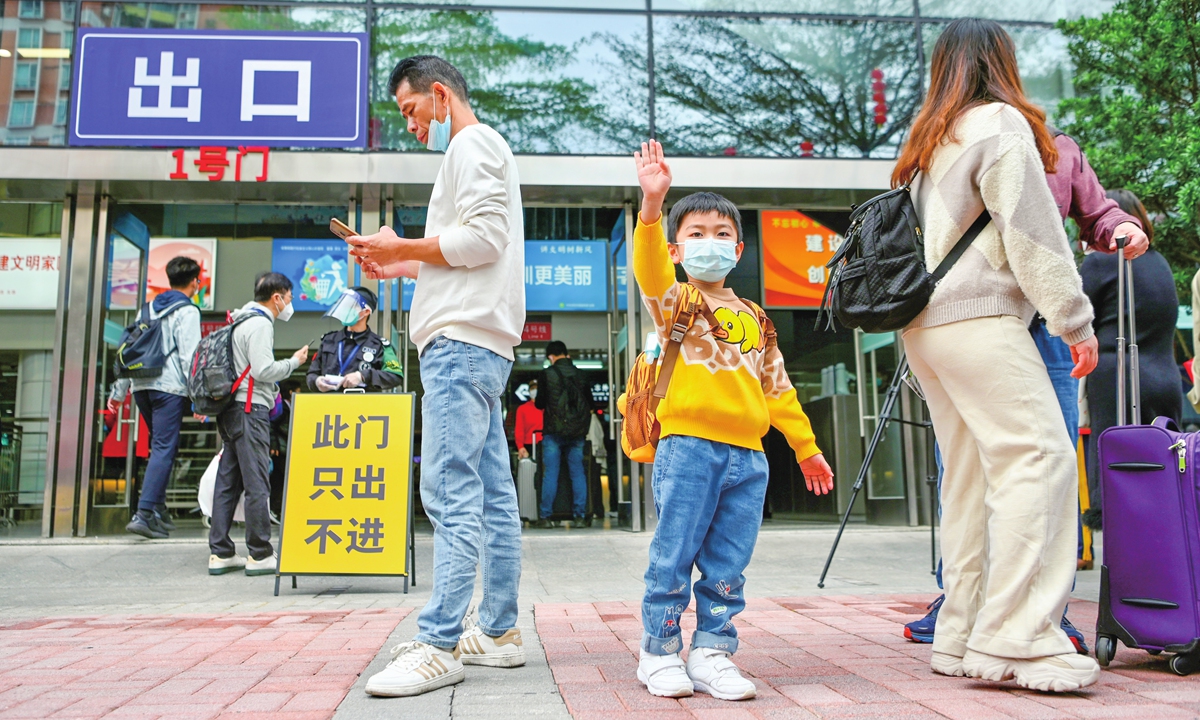First batch of cross-border pupils returns to HK, calls for revoking of nucleic acid tests

A child from Hong Kong waves to the camera when he arrives at the Futian port in Shenzhen, South China's Guangdong Province on January 8, 2023. Photo: VCG
The first batch of about 30 cross-border pupils returned to Hong Kong on Wednesday for face-to-face classes, as this group of students has not been able to attend classes in Hong Kong due to pandemic restrictions since 2020.
Local officials, lawmakers and parents of cross-border students applauded the move, which is seen as a significant sign for people exchanges between the city and the Chinese mainland to return normalcy.
Some parents and representatives from the education sector of Hong Kong also told the Global Times that the Hong Kong Special Administrative Region (HKSAR) government and schools have been fully prepared for the return of cross-border students, and all students are expected to return to in-person classes before the end of February at the latest.
Currently, a major focus is on whether authorities can scrap the daily nucleic acid testing for those students and allow them to use rapid antigen tests to facilitate daily transit between Hong Kong and the mainland.
Fung Kai No. 1 Primary School in Sheung Shui welcomed about 30 cross-border students on Wednesday morning after a three-year suspension of in-person classes, according to local media reports. With a daily quota for cross-border travelers and no separate arrangements in place for cross-border student yet, these pupils are required to reserve a slot and undergo PCR tests before each trip, RTHK said.
A primary student surnamed Chow was quoted as saying in the media report that he is very happy to be back after a three-year absence and he was able to see his classmates and teachers online during the pandemic.
According to the first phase of border resumption plans unveiled by the HKSAR government, the government will release the arrangement for cross-border pupils in February and they won't need to apply for daily quotas. It's expected that cross-border secondary school students will be allowed to attend in-person classes in Hong Kong from the second week of February, while primary school and kindergarten students can return by the end of February, the Education Bureau said on Friday.
Yuxue, whose daughter is among the cross-border students, told the Global Times that she has received a notice from school that her daughter can return to school on February 6. "We appreciate so much that the country made arrangements for resuming people exchanges between Shenzhen and Hong Kong," she said.
The three-year period of online classes had a certain impact on the students' grades, especially for secondary school students, who are in a period of teenage rebellion, and who do not want to be disciplined.
"When she took online classes, she always closed the door so we couldn't supervise her," Yuxue said. "Teachers could not discipline her through online classes, so the impact on her grades is inevitable."
Some parents like Yuxue hoped that the HKSAR government will pay more attention to this group of students, for example, by opening a special lane for these students. Given that there are nearly 30,000 cross-border students, daily cross-border travel and mandatory nucleic acid tests will create other burdens for them.
Lawrence Tang Fei, a lawmaker who is also the vice-chairman of the Hong Kong Federation of Education Workers, told the Global Times that schools are all ready in Hong Kong and all the cross-border students will be able to return to Hong Kong for face-to-face classes by the end of February at the latest.
"But now, a major uncertainty is whether the HKSAR government will arrange PCR test-free travel for those students, or replace it with antigen tests," he said.
It's difficult for pupils to go to school, finish their homework and take nucleic acid tests before returning to Shenzhen after the test results come out, and if this issue can't be solved, it will be difficult for cross-border students to truly return to Hong Kong, Tang said.
For now, those who enter Hong Kong or enter the mainland through Hong Kong need to hold 48-hour nucleic acid tests, which means cross-border pupils need to take a daily test to meet the entry requirement, or within no less than two days.
However, some students may not return to Hong Kong. Kinwai told the Global Times that from 2020 to 2022, his son, a primary student, sometimes took online classes and sometimes went to school. The pandemic forced Kinwai and his wife to live in two cities.
"In September, 2022, when another wave hit Hong Kong, I decided to let the kid study in Shenzhen, as being healthy is more important," he said.
Kinwai said he is hesitant now following the border resumption, and he decided to wait and see whether to send his son back to Hong Kong or to an international school in the mainland. "The child has gradually adapted to the school in Shenzhen and the level of education here is not weaker than in Hong Kong. Also, Hong Kong faces a serious loss of primary school teachers, which affects the quality of study," he said.
Tang, who is also a legislator, called for more efforts to help cross-border students to adapt to studies and life in Hong Kong after returning to school. Many schools are ready to help cross-border students to make up for their delayed online classes, and they may need some psychological counseling to help them readapt to campus life in Hong Kong, Tang said.


